Alonzo Johnson
b. February 8th, 1899 in New Orleans (Louisiana)
d. June 16th, 1970 in Toronto (Canada)
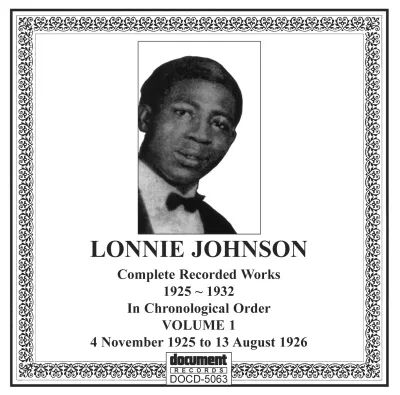
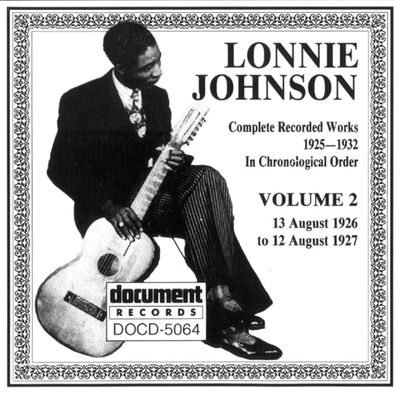
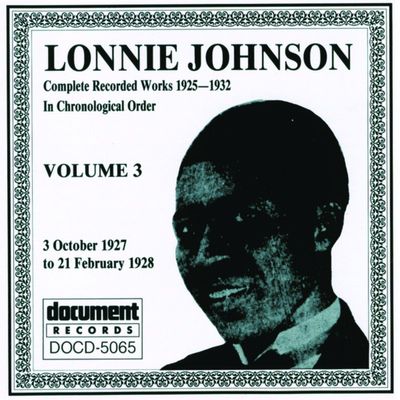
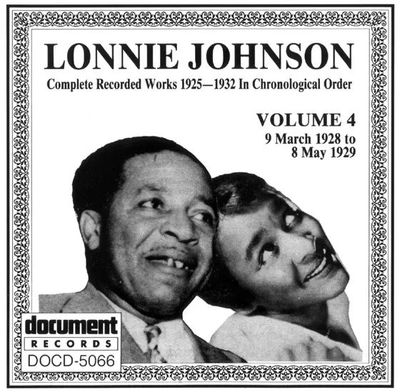
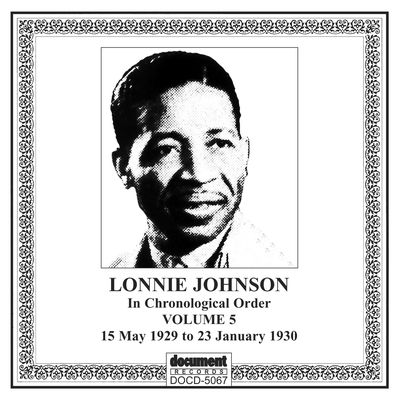
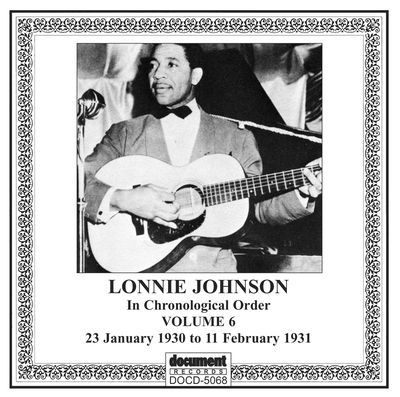
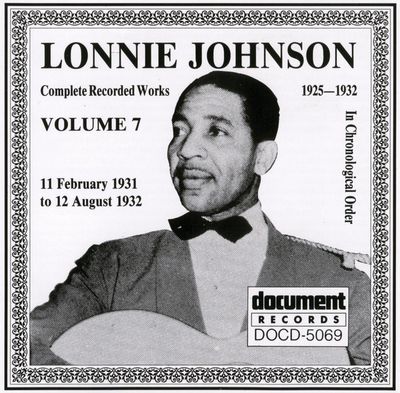
COMPLETE RECORDED WORKS
Document
Volume 1 (November 1925 - August 1926)
Volume 2 (August 1926 - August 1927)
Volume 3 (October 1927 - February 1928)
Volume 4 (March 1928 - May 1929)
Volume 5 (May 1929 - January 1930)
Volume 6 (January 1930 - February 1931)
Volume 7 (February 1931 - August 1932)
Né dans une famille de musiciens à la Nouvelle Orléans, il apprend la guitare, le violon, la mandoline, le banjo et le piano dès l'enfance. Lonnie joue surtout avec son frère le pianiste James "Steady Roll" Johnson dans le quartier de Storyville parfois en compagnie de musiciens de Jazz comme Kid Ory ou Punch Miller. En 1921, les deux frères s'installent à Saint Louis. Quelques années plus tard, Lonnie se marie avec Mary Smith avec laquelle il eut six enfants avant de divorcer en 1932. Mais, c'est en 1925 à Saint Louis que Lonnie gagne un concours Blues qui lui ouvre les portes du label Okeh. Entre 1925 et 1932 pour Okeh, il enregistre environ 130 morceaux avec un certain succès. Son élégance physique, sa virtuosité technique à la guitare (ses solos note à note préfigurent les solos de guitare modernes), sa capacité à jouer dans tous les styles (blues, jazz, ballades, music-hall) font de lui un musicien très apprécié et très demandé. Sa popularité lui permet d'enregistrer aussi derrière son amie Victoria Spivey ou Texas Alexander. Ses titres de cette période sont souvent remarquables : "Mr Johnson's blues", "Steppin' on the blues", "Four hands are better than two", "Backwater blues", "6/88 glide", "Playing with the strings", "Blues in G". On retient en particulier ses duos sensationnels avec un autre virtuose de la guitare Eddie Lang alias Blind Willie Dunn : "Two tone stomp", "Guitar blues", "A handful of riffs", "Hot fingers". Après Saint Louis, Lonnie vit ensuite à Chicago puis à Cleveland.
Born into a family of musicians in New Orleans, he learned the guitar, violin, mandolin, banjo and piano from childhood. Lonnie mostly plays with his brother the pianist James "Steady Roll" Johnson in the Storyville neighborhood, sometimes in the company of jazz musicians like Kid Ory or Punch Miller. In 1921, the two brothers moved to Saint Louis. A few years later, Lonnie married Mary Smith with whom he had six children before divorcing in 1932. But, it was in 1925 in Saint Louis that Lonnie wins a Blues contest which opens the doors to the Okeh label. Between 1925 and 1932 for Okeh, he recorded around 130 songs with some success. His physical elegance, his technical virtuosity on guitar (his note for note solos prefigure the modern guitar solos), his ability to play in all styles (blues, jazz, ballads, music hall) make him a very appreciated musician. and in great demand. His popularity allows him to also record behind his friend Victoria Spivey or Texas Alexander. His titles from this period are often remarkable : "Mr Johnson's blues", "Steppin' on the blues", "Four hands are better than two", "Backwater blues", "6/88 glide", "Playing with the strings" , "Blues in G". We particularly remember his sensational duets with another guitar virtuoso Eddie Lang alias Blind Willie Dunn : "Two tone stomp", "Guitar blues", "A handful of riffs", "Hot fingers". After Saint Louis, Lonnie then lives in Chicago and in Cleveland.
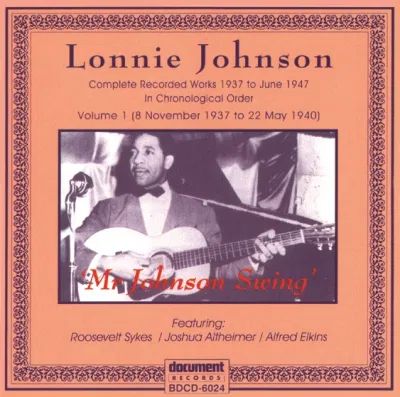
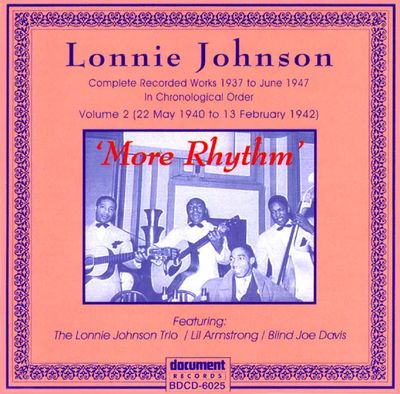
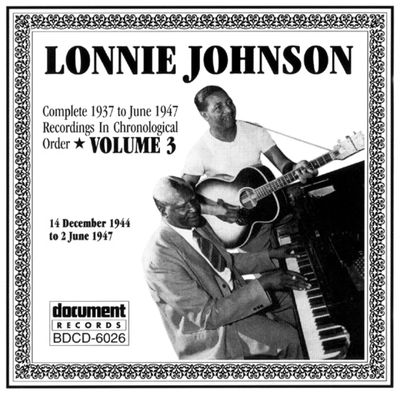
COMPLETE RECORDED WORKS
Document
Volume 1 (November 1937 - May 1940)
Volume 2 (May 1940 - February 1942)
Volume 3 (December 1944 - June 1947)
Après quelques années d'absence - dues à une dispute avec le producteur Lester Melrose - Lonnie Johnson enregistre d'abord pour Decca. Puis il travaille pour Bluebird (un label appartenant à RCA-Victor) où il expérimente la guitare électrique pour la première fois. Cette seconde période de sa carrière porte essentiellement sur ses faces gravées pour ces deux labels. Sa virtuosité est intacte : "Swing out rhythm", "Mr Johnson swing", "Get yourself together", "Chicago blues". Lonnie est souvent placé dans un contexte orchestral avec les bassistes Alfred Elkins ou Andrew Harris et les pianistes Joshua Altheimer, Lil' Armstrong, Roosevelt Sykes ou Blind John Davis. Chez Decca, Lonnie joue aussi derrière de nombreux artistes du label comme Peetie Wheatstraw, Georgia White, Alice Moore, Johnnie Temple. Comme beaucoup d'artistes, il n'enregistre pas grand chose sur la période 1942 - 1944 notamment à cause de la guerre et du Petrillo's Ban. Plus tard, Lonnie collabore donc avec les labels Disc et Aladdin en 1946-47 (avec le pianiste Blind John Davis) mais le matériel gravé à cette époque se montre nettement moins inspiré qu'avant.
After a few years of absence - due to an argument with producer Lester Melrose - Lonnie Johnson first records for Decca. Then he worked for Bluebird (a label owned by RCA-Victor) where he experimented electric guitar for the first time. This second period of his career mainly concerns his recorded sides for these two labels. His virtuosity is intact : "Swing out rhythm", "Mr Johnson swing", "Get yourself together", "Chicago blues". Lonnie is often placed in an orchestral context with bassists Alfred Elkins or Andrew Harris and pianists Joshua Altheimer, Lil' Armstrong, Roosevelt Sykes or Blind John Davis. At Decca, Lonnie also plays behind many of the label's artists such as Peetie Wheatstraw, Georgia White, Alice Moore, Johnnie Temple. Like many artists, he did not record much over the period 1942 - 1944, particularly because of the war and the Petrillo's Ban. Later, Lonnie therefore collaborated with the Disc and Aladdin labels in 1946-47 (with the pianist Blind John Davis) but the material cut at that time was clearly less inspired than before.
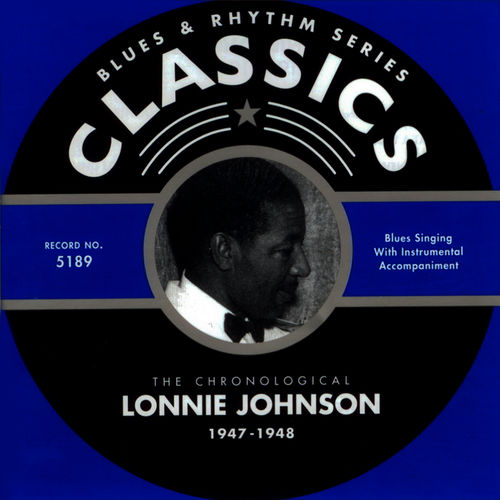
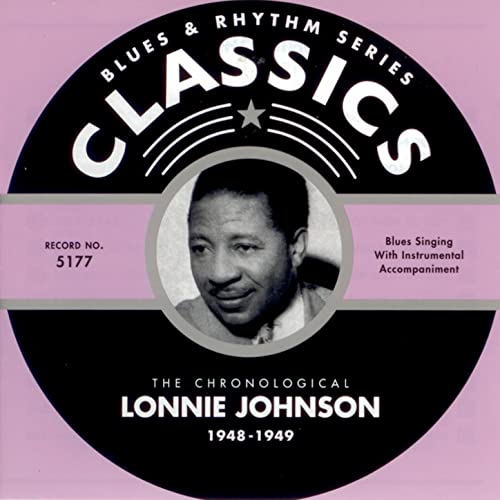
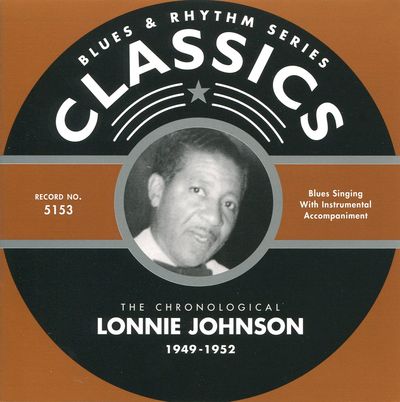
THE CHRONOLOGICAL 1947-1948
Classics
December 1947
THE CHRONOLOGICAL 1948-1949
Classics
August 1948 - May 1949
THE CHRONOLOGICAL 1949-1952
Classics
November 1949 - June 1952
Après la seconde guerre mondiale, les goûts du public ont évolué et Lonnie s'oriente vers un son plus Rhythm & Blues enregistrant pour King à Cincinnati avec l'ajout régulier de cuivres (Red Prysock, Tom Archia, Hal Singer, Paul Renfro, Ray Felder) : "You can't buy love", "Nothing but trouble", "Friendless blues", "Blues in the clouds", "Playing around", "Troubles ain't nothing but the blues". A la suite du succès de "Tomorrow night" en 1948, Lonnie continue de graver de nombreuses ballades qui paraissent aujourd'hui bien surannées. Malgré ce succès, sa renommée décroit lentement et Lonnie se détache de plus en plus de la musique (il participe encore à une séance pour le label Rama en 1953). Après une tournée en Angleterre en 1952, Lonnie s'installe à Philadelphie et travaille comme concierge.
After World War II, public tastes changed and Lonnie moved towards a more Rhythm & Blues recording for King in Cincinnati with the regular addition of horns (Red Prysock, Tom Archia, Hal Singer, Paul Renfro, Ray Felder) : "You can't buy love", "Nothing but trouble", "Friendless blues", "Blues in the clouds", "Playing around", "Troubles ain't nothing but the blues". Following the success of "Tomorrow night" in 1948, Lonnie continues to record many ballads which appear today very old-fashioned. Despite this success, his fame slowly waned and Lonnie became more and more detached from music (he still took part in a session for the Rama label in 1953). After touring England in 1952, Lonnie moved to Philadelphia and worked as a janitor.
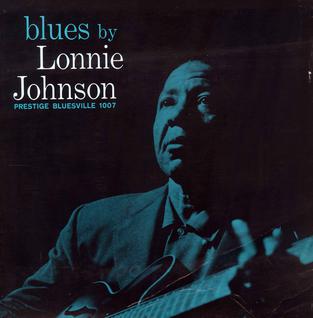
BLUES BY LONNIE JOHNSON
Prestige - Bluesville
March 1960
Grâce à l'aide du guitariste de jazz Elmer Snowden, Lonnie est redécouvert par Chris Albertson (disc-jockey à WHAT-FM) qui lui produit ce véritable album de retour chez Prestige - Bluesville. Pour celui-ci, Lonnie est entouré de bons jazzmen : Hal Singer (saxophone), Claude Hopkins (piano), Wendell Marshall (basse) et Bobby Donaldson (batterie). Atmosphère jazzy, tempos un peu répétitifs mais écoute très agréable néanmoins.
With the help of jazz guitarist Elmer Snowden, Lonnie was rediscovered by Chris Albertson (disc-jockey at WHAT-FM) who produced him this real back to business album at Prestige - Bluesville. For this one, Lonnie is surrounded by good jazzmen : Hal Singer (saxophone), Claude Hopkins (piano), Wendell Marshall (bass) and Bobby Donaldson (drums). Jazzy atmosphere, somewhat repetitive tempos but very pleasant listening nonetheless.
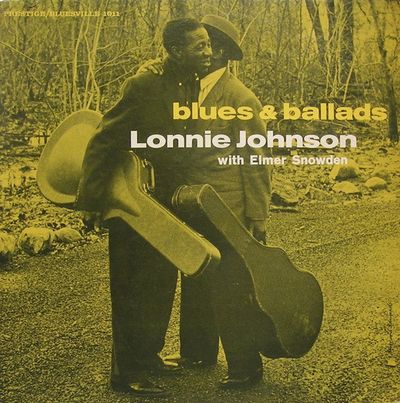
BLUES AND BALLADS
Prestige - Bluesville
April 1960
Pour ce second disque chez Bluesville, toujours sous la supervision de Chris Albertson, Lonnie Johnson est cette fois associé à son ami le guitariste Elmer Snowden. Lonnie prend la guitare électrique et Elmer la guitare acoustique. Les deux hommes semblent en bonne forme et se complètent de manière convaincante. Répertoire Jazz-Blues encore un peu répétitif par instants.
For this second record on Bluesville, still under the supervision of Chris Albertson, Lonnie Johnson is this time associated with his friend guitarist Elmer Snowden. Lonnie takes the electric guitar and Elmer the acoustic guitar. Both men appear in good shape and complement each other in a compelling way. Jazz-Blues repertoire sometimes repetitive at times.
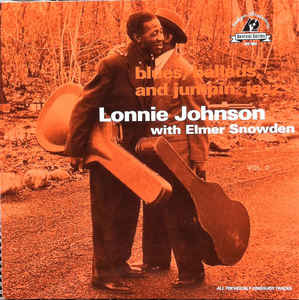
BLUES, BALLADS AND JUMPIN' JAZZ vol.2
Prestige - Bluesville
April 1960
Gravé le même jour que le précédent "Blues and ballads", ce disque est enregistré avec Elmer Snowden et le producteur Chris Albertson. On trouve une superbe reprise de "Lester leaps in" où brille Snowden (comme sur "C-jam blues") et une belle lecture également de "Stormy weather" disponible en deux versions.
Engraved the same day as the previous "Blues and Ballads", this album is recorded with Elmer Snowden and producer Chris Albertson. We find a superb cover of "Lester leaps in" where Snowden shines (as on "C-jam blues") and a nice reading also of "Stormy weather" available in two versions.
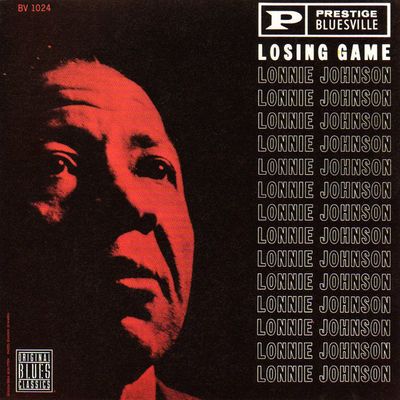
LOSING GAME
Prestige - Bluesville
December 1960
Pour ce nouveau disque pour Prestige - Bluesville, Lonnie est placé sous la supervision d'Esmond Edwards. Cette fois, il est seul à la guitare acoustique (et au piano sur "Evil woman"). "My little kitten Susie", "Moanin' blues", "Lines in my face" et une sympathique reprise de "Summertime" figurent parmi les bons moments du programme.
For this new record for Prestige - Bluesville, Lonnie is placed under the supervision of Esmond Edwards. This time he is alone on acoustic guitar (and on piano on "Evil woman"). "My little kitten Susie", "Moanin' blues", "Lines in my face" and a nice cover of "Summertime" are among the good moments of the program.
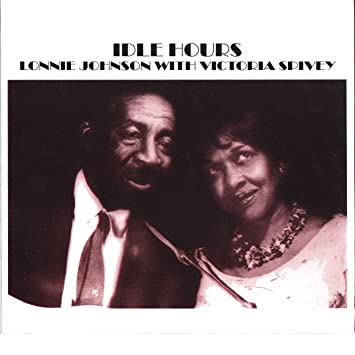
IDLE HOURS
Prestige - Bluesville
July 1961
Pour cet opus, Lonnie est accompagné du pianiste Cliff Jackson. Sur trois morceaux, son amie la chanteuse Victoria Spivey chante (ils se connaissent depuis les années 20). Quelques excellents moments parsèment le programme : "Oh yes baby", "Long time blues", "Idle hours".
For this opus, Lonnie is accompanied by pianist Cliff Jackson. On three tracks, his friend the singer Victoria Spivey sings (they have known each other since the 20's). Some excellent moments dot the program : "Oh yes baby", "Long time blues", "Idle hours".
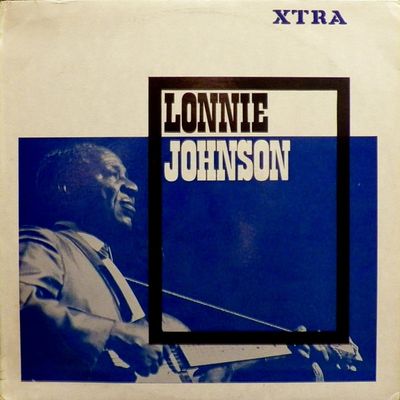
LONNIE JOHNSON
Xtra
August 1961
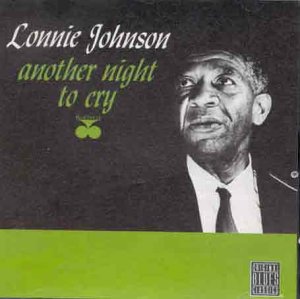
ANOTHER NIGHT TO CRY
Prestige - Bluesville
April 1962
Dernier disque pour Bluesville produit cette fois par Kenneth Goldstein. Comme à son habitude, Lonnie - seul à la guitare - délivre un bon album inspiré et convaincant. On retient en particulier "Another night to cry", "I got news for you baby", "Blues after hours".
Last record for Bluesville produced this time by Kenneth Goldstein. As usual, Lonnie - alone on guitar - delivers a good, inspired and convincing album. We particularly remember "Another night to cry", "I got news for you baby", "Blues after hours".
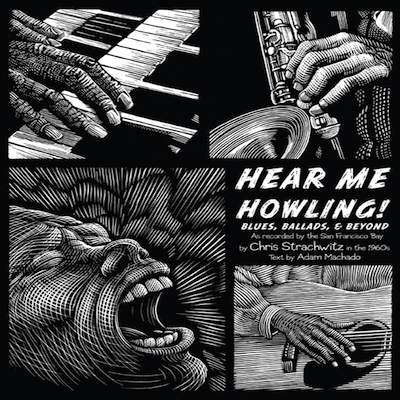
HEAR ME HOWLING
Arhoolie
Early 1960's
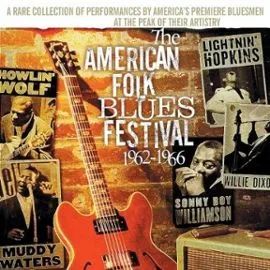
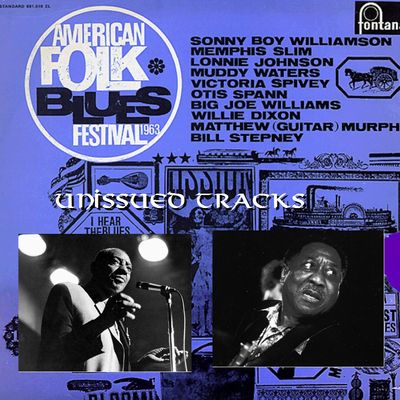
THE AMERICAN FOLK BLUES FESTIVAL 1962 - 1966
Hip-O
UNISSUED TRACKS - AMERICAN FOLK BLUES FESTIVAL 1963
Blue Eye blog (mp3)
September 1963
Une excellente version de "Another night to cry" accompagné pour une fois d'Otis Spann (piano), Willie Dixon (basse) et Billy Stepney (batterie).
An excellent version of "Another night to cry" accompanied for once by Otis Spann (piano), Willie Dixon (bass) and Billy Stepney (drums).
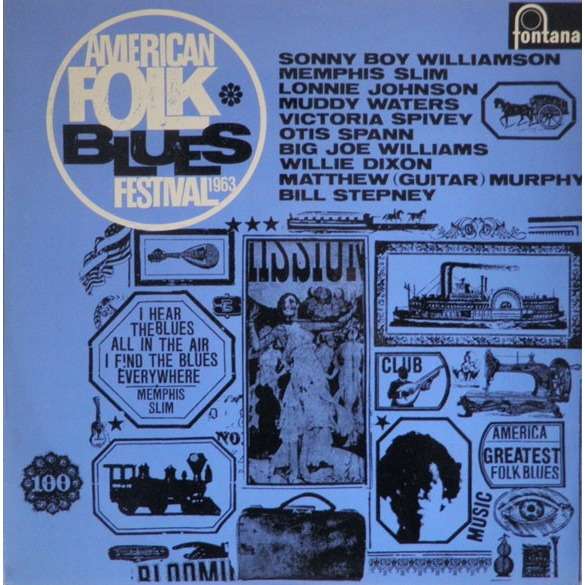
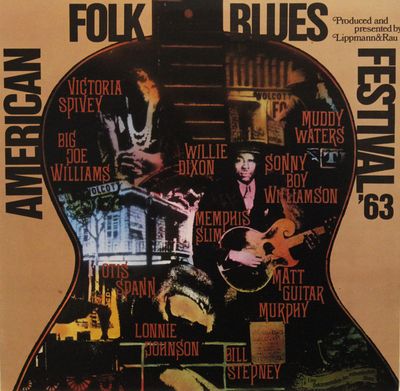
AMERICAN FOLK BLUES FESTIVAL '63
Fontana
L+R
October 1963
Invité à participer à la tournée de l'American Folk Blues Festival de 1963, Lonnie se produit - la plupart du temps - seul sur scène à la guitare n'ayant rien perdu de son élégance naturelle. Dans ce recueil, on peut l'entendre lors du concert de Breme sur "It's too late to cry".
Invited to take part in the 1963 American Folk Blues Festival tour, Lonnie performs - most of the time - alone on stage on guitar having lost nothing of his natural elegance. In this collection, we can hear him during Bremen's concert on "It's too late to cry".
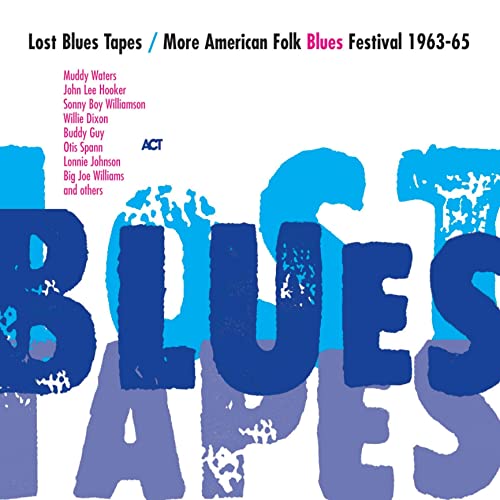
THE LOST BLUES TAPES
ACT
October 1963
Deux autres morceaux capturés lors du même concert de Breme : "Careless love" et "C.C. rider".
Two other tracks captured during the same Bremen concert : "Careless love" and "C.C. rider".
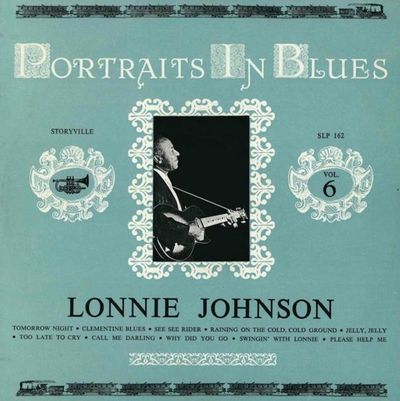
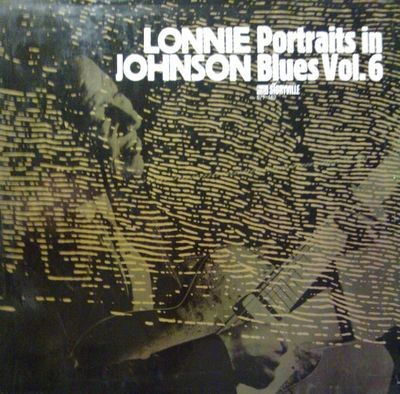
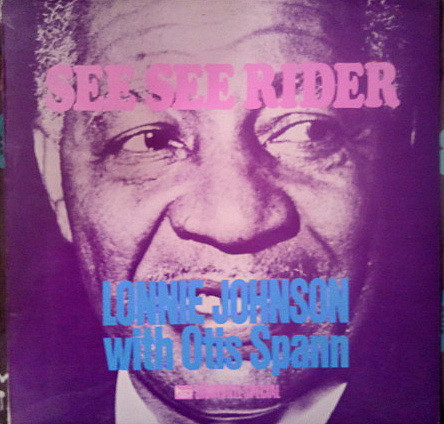
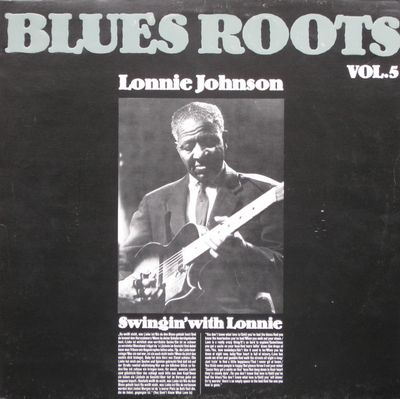
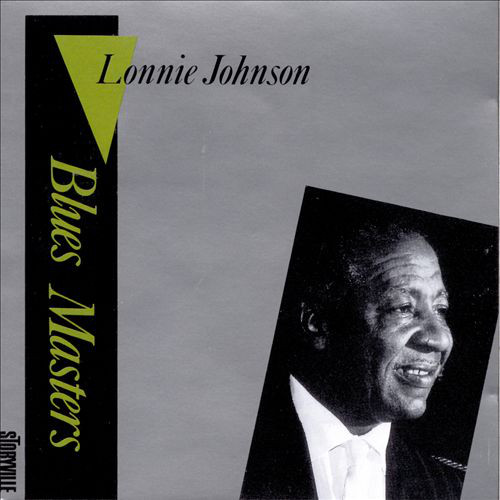
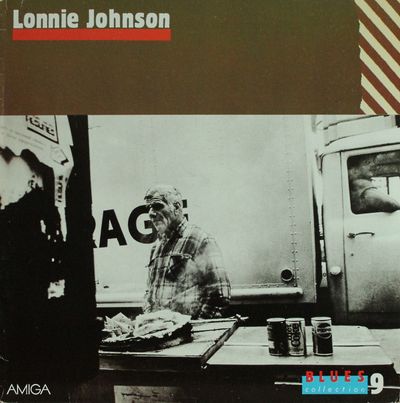
PORTRAITS IN BLUES vol.6
Storyville
SEE SEE RIDER
Storyville
BLUES ROOTS vol.5
Storyville
BLUES MASTERS vol.4
Storyville
BLUES COLLECTION vol.9
Amiga
October 1963
Cet album fut gravé au Danemark pendant la tournée de l'American Folk Blues Festival pour le label Storyville (dirigé par Karl-Emil Knudsen). Pour cette occasion, Lonnie est accompagné par le pianiste Otis Spann. Les deux hommes se complètent plutôt bien et proposent un programme plaisant : "Clementine blues", "Too late to cry", "Raining on the cold cold ground", "Swingin' with Lonnie", "My baby is gone". Des nombreuses rééditions proposées par Storyville et d'autres, il faut préférer le CD "Blues Masters vol.4" qui reprend l'intégralité de cette belle séance.
This album was recorded in Denmark during the American Folk Blues Festival tour for the Storyville label (managed by Karl-Emil Knudsen). For this occasion, Lonnie is accompanied by pianist Otis Spann. The two men complement each other rather well and offer a pleasant program : "Clementine blues", "Too late to cry", "Raining on the cold cold ground", "Swingin' with Lonnie", "My baby is gone". Of the many reissues proposed by Storyville and others, we must prefer the CD "Blues Masters vol.4" which covers the entirety of this nice session.
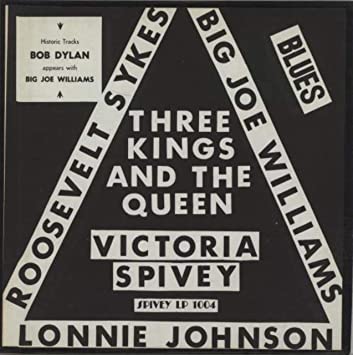
THREE KINGS AND THE QUEEN
Spivey
November 1963
Au retour de l'American Folk Blues Festival, Lonnie trouve l'opportunité de graver une poignée de morceaux pour le label de son amie Victoria Spivey à New York. On trouve quatre bons titres de Lonnie dans cette belle anthologie : "Mr Johnson guitar talks", "Stop talking", "Stick by me baby", "Four shots of gin".
Upon returning from the American Folk Blues Festival, Lonnie finds the opportunity to cut a handful of tracks for his friend Victoria Spivey's label in New York. We find four good Lonnie tracks in this beautiful anthology : "Mr Johnson guitar talks", "Stop talking", "Stick by me baby", "Four shots of gin".
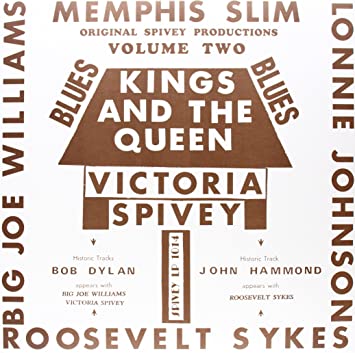
KINGS AND THE QUEEN vol.2
Spivey
November 1963
Deux autres morceaux provenant de la même séance pour Spivey.
Two other tracks from the same session for Spivey.
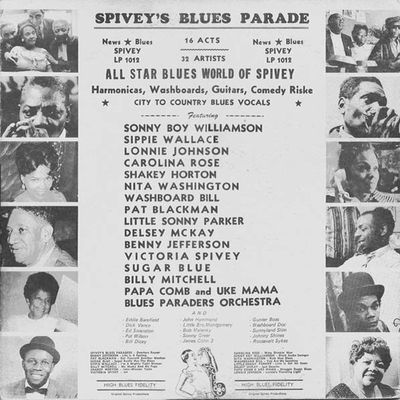
SPIVEY'S BLUES PARADE
Spivey
November 1963
Un titre ("Lonnie's traveling light") issu de la même séance.
A title ("Lonnie's traveling light") from the same session.
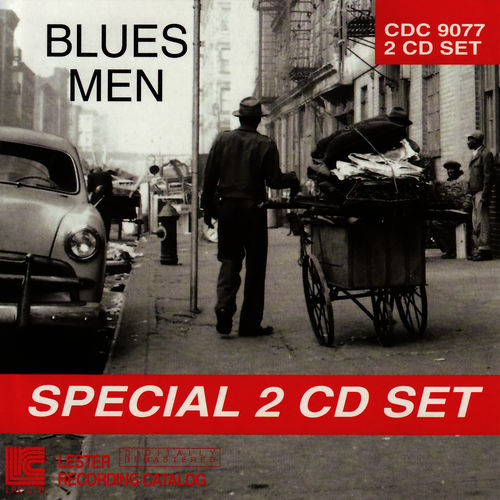
BLUES MEN
LRC
1964
Deux morceaux gravés en concert en 1964 dont une belle version de "Slow and easy".
Two pieces engraved in concert in 1964 including a beautiful version of "Slow and easy".
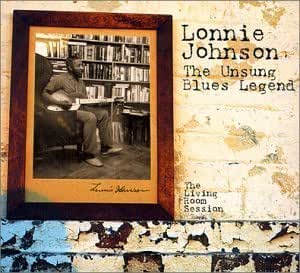
THE UNSUNG BLUES LEGEND : THE LIVING ROOM SESSION
Blues Magnet
1965
Ce CD paru en 2000 relate une séance informelle de Lonnie Johnson enregistrée au domicile de son ami Bernie Strassberg à Forest Hill (New York). Seul avec sa guitare, il délivre une performance intéressante passant en revue son répertoire entre Blues et Jazz. Un programme un peu long et monotone qu'il vaut mieux conseiller aux amateurs confirmés. En mai 1965, Lonnie Johnson s'installe au Canada à Toronto. Il ouvre son propre club "Home of the Blues" sur Yorkville Avenue mais malheureusement ce fut un échec.
This CD, released in 2000, relates an informal session by Lonnie Johnson recorded at the home of his friend Bernie Strassberg in Forest Hill (New York). Alone with his guitar, he delivers an interesting performance reviewing his repertoire between Blues and Jazz. A somewhat long and monotonous program that it is better to recommend to experienced fans. In may 1965, Lonnie Johnson moved to Canada in Toronto. He opened his own "Home of the Blues" club on Yorkville Avenue but unfortunately it was a failure.
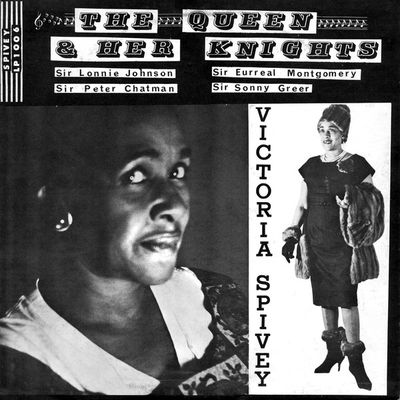
THE QUEEN AND HER KNIGHTS
Spivey
June 1965
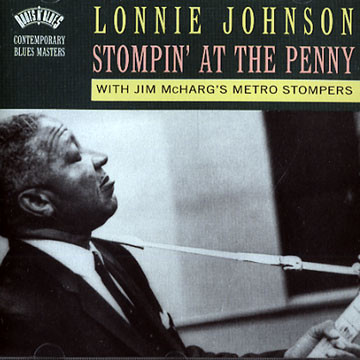
STOMPIN' AT THE PENNY
Columbia
November 1965
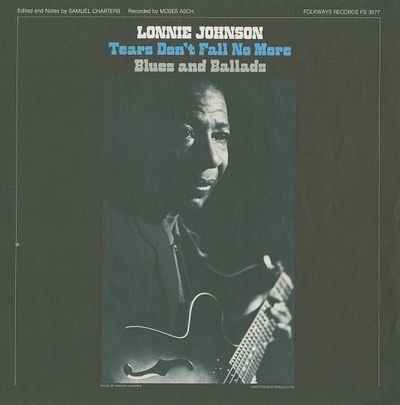
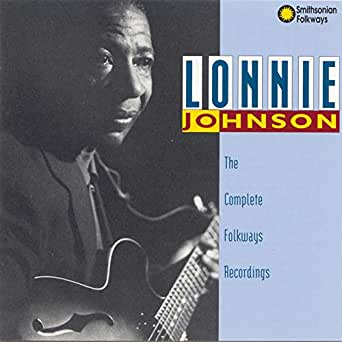
TEARS DON'T FALL NO MORE
Folkways
THE COMPLETE FOLKWAYS RECORDINGS
Smithsonian - Folkways
1967
Cet opus est produit par Sam Charters pour le label Folkways de Moses Asch. Lonnie est seul à la guitare et joue un répertoire composé essentiellement de blues et de ballades. Le programme reste répétitif et parfois ennuyeux. On peut tout de même ressortir les intéressants "Raise the window high" et "Juice headed baby".
This opus is produced by Sam Charters for Moses Asch's Folkways label. Lonnie is alone on guitar and plays a repertoire consisting mainly of blues and ballads. The program remains repetitive and sometimes boring. We can still point out the interesting "Raise the window high" and "Juice headed baby".
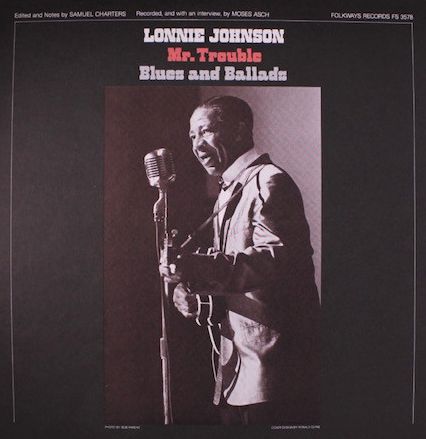

MR TROUBLE
Folkways
THE COMPLETE FOLKWAYS RECORDINGS
Smithsonian - Folkways
1967
Seconde livraison pour Folkways sous la supervision de Sam Charters. Il fut probablement gravé lors des mêmes séances que "Tears don't fall no more". On entend toujours ce mélange de ballades et de blues bien exécuté mais un peu ennuyeux. Victime d'un accident de la route en mars 1969. Lonnie est renversé par une voiture et est gravement blessé à la hanche et aux reins. Il ne s'en remis jamais vraiment. Il décède en juin 1970.
Second installment for Folkways under the supervision of Sam Charters. It was probably recorded during the same sessions as "Tears don't fall no more". We always hear this mixture of ballads and blues well executed but a little boring. Victim of a road accident in march 1969. Lonnie was hit by a car and was seriously injured in hip and kidney. He never fully recovered. He died in june 1970.